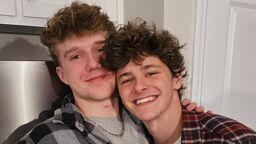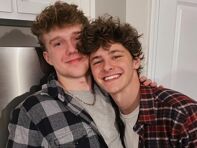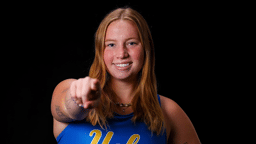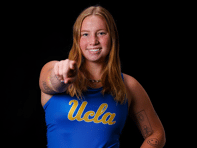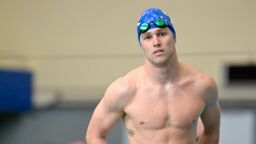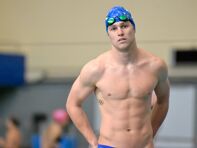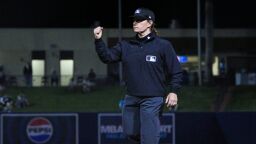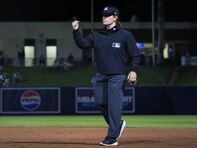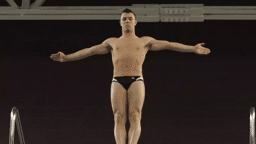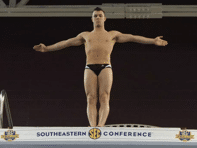I’m walking to the ballpark during Game 6 of the 2020 World Series. I’m not walking in there as a fan who purchased a ticket; I’m walking in as a member of the media.
I get to my press box seat, sit down and look at glorious Globe Life Field in Arlington, Texas. Then the emotions hit me.
Two years ago, I never thought I’d be in this position. Here I was as an out gay man. I was covering the Fall Classic and witnessed the Los Angeles Dodgers hoisting a World Series Championship from the press box. To see Julio Urias and Austin Barnes hug it out and later get mobbed by their teammates after the final out brought a smile to my face, knowing where I was in life.
I’ll never forget April 9, 2018, the lowest day in my life.
I woke up that morning wondering if I should even go to my day job. I thought, “What’s the point of doing that? If I don’t go, will anyone care? Sure, they’ll care because I work there, but will anyone care about me as a person?” I had a voice always screaming inside my head that I was just wasting space and was a nuisance to everyone.
I got out of the shower and thought that if I die, will anyone care? I proceeded to go to the kitchen and grabbed a steak knife and placed the tip of the blade slightly against my chest as warm tears glided down my cheek. I just needed to dig the blade in there, but I hesitated and pulled it back.
I then took the knife and ran it on my arms, drawing no blood, just scratches. I talked myself out of doing any more and went to work that day. The next day I thought about it again, but that knife never left the drawer. To this day, no blade has made that close of a contact to my chest.
I am a 29-year-old gay man who works at a full-time job with a side job covering Dallas sports, especially the Texas Rangers. I’m an out gay man and a damn proud one. It’s the icing on a cake that turned my life around, a life that I didn’t think was possible, both mentally and physically.
I’ve always been career-oriented and sports are a passion of mine. In elementary school it was baseball day in and day out between April and September. When fall came, football became my sport to follow. While my cousins would go outside and play, I preferred spending my time sitting on the couch with my uncles watching the Cubs game as an 8-year old. I wanted to start my career as a sports broadcaster trying to become a Vin Scully or a Joe Buck, which won’t happen, but it was a goal I thought was possible.

As I progressed through school my aspirations fell and I felt like things weren’t going to happen to bolster a sports career. Then I started thinking more about myself. In college, I started feeling something strange — I liked men. I never gave a single thought to my sexuality before.
Even though I was obsessed with sports and athletes, there was no physical or sexual attraction. I was so immersed into the sports world that I forgot all of the other stuff until the early part of the 2010s. I was confused.
I didn’t know any gay guys. I had only been exposed to the Hollywood gay stereotype, so the only gay exposure I got were flamboyant dudes who talk in high pitch voices with energetic moves and liked figure skating. I thought I couldn’t be gay and maybe I was just curious.
Years went by, and the feelings didn’t stop. I saw a psychiatrist for two weeks and quit. He didn’t help that much, and well, I kind of liked him (in the way you think). My fear petrified me and I got confused even more. I again put this on the back burner, but that only made things worse. To be clear, I wasn’t surrounded by homophobia. I just felt like an outcast wherever I went.
After I graduated, I programmed my brain to stick to sports, and it continued to get worse. The loneliness kicked in and by 2018, I couldn’t take it anymore. I knew I was gay. I figured my career in sports was over since a gay guy working in professional sports just doesn’t happen. Each day my confidence got worse and I hit rock bottom.
I didn’t talk to anyone because I didn’t trust anyone, even myself. I couldn’t tell anyone because I felt like a worthless loser in the closet, bawling my eyes out once a day. I felt like I had no purpose. There were times where I would just wake up, go to work, go home and go to sleep. There were even times, I’d run to the bathroom crying during my day job.
After the incident in April 2018, I knew something had to change. I decided to seek professional help months later and it was the most significant decision ever made. On the first day, I came out as gay to my therapist. I told myself I had to let my guard down if I want to survive. I had to rip some Band-Aids off, and be open.
The last day I saw him (which was two months ago), I cried. I never shed a tear during our sessions, but it was an emotional day because I knew where I started and where I finished. Therapy or counseling is something I would recommend to everyone. When I run into a personal issue my therapist knows me well and he can insert my input into his solutions (basically using my lingo to solve my problems to hear it from my perspective). I had never felt as confident as I did. The next step was being more comfortable and letting my guard down.
The next year, 2019, was one of the best years of my life. I started a writing career (a specific thanks to certain friends) and got the chance to cover a team I grew up watching. There were times things felt strange. I mean, a closeted gay man covering a baseball team was hardly a norm, and it still ate at me, but I didn’t want to say anything because I didn’t want to ruin the moment.
Later in the year I told a few more people I was gay. I came out to some co-workers, some media members and even to my brother. Each interaction warmed my heart. There was no backlash, and in all instances, nothing changed. The friendships remained the same, and discussions went on like nothing ever happened.
I had a New Year’s Resolution for 2020, and that was to tell my parents. At 9 a.m. Jan. 1, I had the balls and told them. It was challenging, but again, not as difficult as I thought. I left the conversation thrilled, and to this day, discussions are still the same as before.
For months I challenged myself to go public, but again struggled with the thought of a gay man covering sports. I couldn’t get rid of that nasty stereotype. I thought everyone would shun me, and I could lose everything I gained.
In March, I saw numerous LGBT members share their stories in the media. Guys who didn’t come close to fit Hollywood’s stereotype came out as gay, and the revelation hit. With some advice from some excellent people, I convinced my brain that it didn’t matter. I trusted myself and I took to social media and put it out there that I was gay. Notifications piled up.
As the calendar moves through June and #PrideMonth , I feel it's this is the right time to come out as a gay man. To anyone who helped me, listened, and accepted, I can't thank you enough. Honestly, you saved my life.
— Alex Plinck 🏳️🌈 (@aplinckTX) June 14, 2020
Now lets get some freaking baseball started and "Play Ball!" pic.twitter.com/Kg4iI8AJmt
I kept biting my fingernails and wondered if I made a mistake. The answer was no. My friends chimed in, congratulating me. Employees of the Rangers — the group I was worried most about — sent their best wishes. I was sitting on my bed crying, this time in pure joy. Interactions remained the same, and I still was my same awkward self, just more comfortable with who I was. I was able to even work all postseason games at Globe Life Field.
Before the 2020 season started, I bought a necklace, personally engraved. The back of the chain says, “Ask yourself, do you matter?” “What is your end goal?” “Why are you here?” I wore it for every game and event I went to in 2020. It became a reminder to me if I ever second-guess myself or if I second-guess my decision to pull back that steak knife that one morning to ask those questions and realize I do matter.
I don’t see the 2020 World Series being the end, I see it as another stepping stone. I am happy entering my third season covering the Texas Rangers and making sure Rangers fans get the content they need. I am Alex Plinck and I am proud of who I am.
Alex Plinck, 29, is graduate from the University of North Texas. He studied in UNT’s Radio, Television program and earned a bachelor’s degree. He is in his third year of covering the Texas Rangers for Dallas Sports Fanatic. Alex can be reached on Twitter (@aplinckTX), Instagram (aplincktex), or email at [email protected]
Story editor: Jim Buzinski
If you are an out LGBTQ person in sports and want to tell your story, email Jim ([email protected])
Check out our archive of coming out stories.
If you’re an LGBTQ person in sports looking to connect with others in the community, head over to GO! Space to meet and interact with other LGBTQ athletes, or to Equality Coaching Alliance to find other coaches, administrators and other non-athletes in sports.
If you are considering suicide, LGBTQ youth (ages 24 and younger) can reach the Trevor Project Lifeline at 1-866-488-7386. Adults can contact the National Suicide Prevention Lifeline at 1-800-273-8255 24 hours a day, and it’s available to people of all ages and identities. Trans or gender-nonconforming people can reach Trans Lifeline at 877-565-8860.





